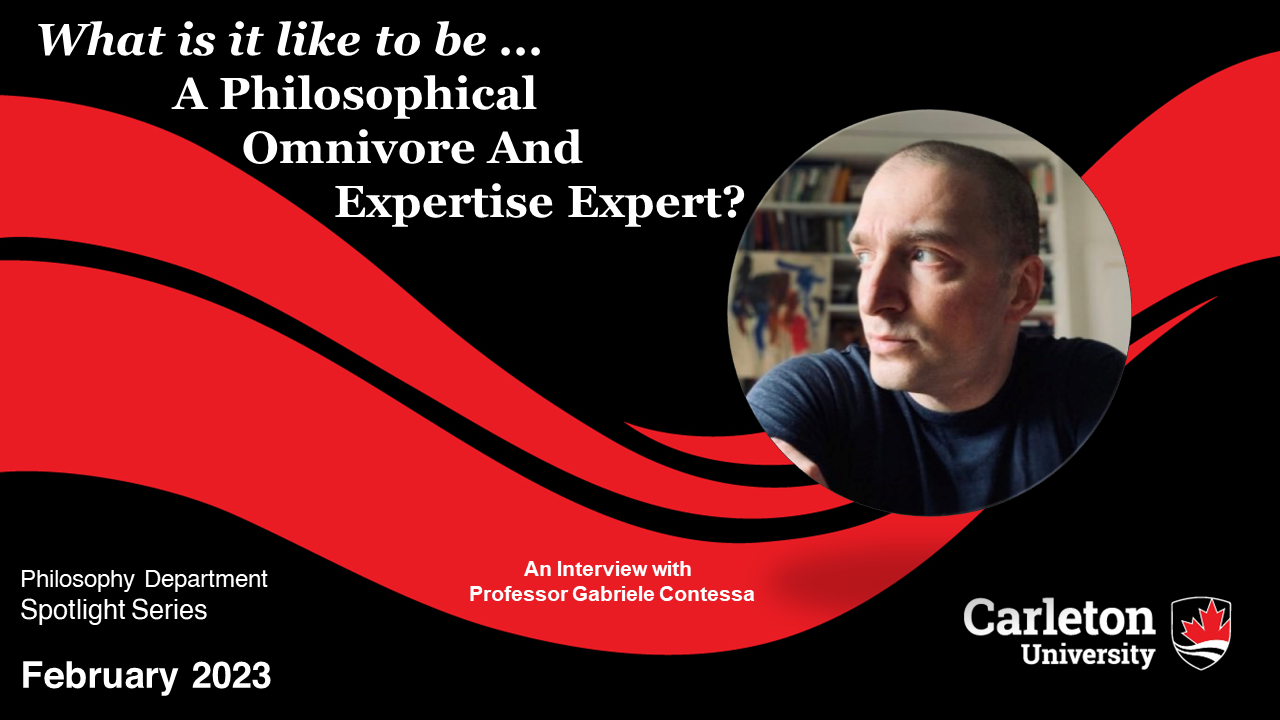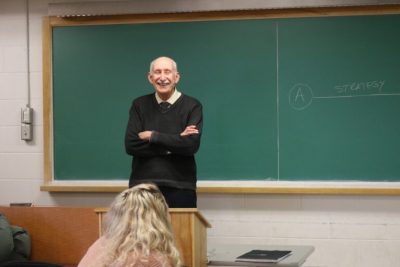What is it Like to be a Philosophical Omnivore and Expertise Expert? An Interview with Professor Gabriele Contessa

Meet Professor Gabriele Contessa, a longtime faculty member in Carleton University’s Department of Philosophy.
In the context of the global pandemic, Professor Contessa’s research in the philosophy of science and social epistemology is more relevant than ever. We had a chat with him to hear about his current research work on trust in science, and about his new course ‘Truth and Propaganda,’ among other things. It was also a great opportunity to learn a bit more about him and his unique journey in philosophy.
Thank you for chatting with us, Professor Contessa. You got your philosophical start far away from here, at the Sapienza in Rome. Could you tell us a bit about what it was like to start off studying philosophy in Italy? Was the culture surrounding undergraduate study much different than it is here?
Professor Gabriele Contessa: My impression is that studying philosophy in Rome is very different from studying it at Carleton. For one thing, in Rome, it was very much sink or swim. We didn’t use any introductory textbooks or anthologies. We just read primary sources pretty much from cover to cover. This means that, in my early days as a philosopher in training, I read an awful lot of classics of Western philosophy. I only came across analytic philosophy in my second year there, when I took a logic course (which I now realize was incredibly hard compared to the standard introductions to logic) and a philosophy of language course, in which we read both Wittgenstein’s Tractatus and his Philosophical Investigations. I was hooked. I was willingly going to 8am classes on a Saturday morning!
For your Doctorate, you decided to go to the UK to study at the LSE. What were you interested in at the time, and why did you choose that institution?
GC: While I was writing my undergraduate thesis (which ended up being in philosophy of science), I stumbled across a book by Nancy Cartwright entitled Why the Laws of Physics Lie and I fell in love with it. Everything about it, from the title to the argumentation style, was so brilliant and unique. At the time, Nancy was still teaching at the LSE, so that seemed to be the perfect place for me to work on the stuff I was interested in at the time, which was mostly why some scientific models are so good at representing aspects or portions of the world in spite of their being so highly idealized. Plus, the LSE is in London, which, to be honest, sounded much more appealing than any of the other potential candidates I was considering. The LSE ended up being the only grad school I applied to (which in retrospect was kind of foolish of me) but, in the end, I was lucky (but don’t try this at home!).
You have lived and worked in North America for almost two decades. Is there any particular reason you chose to pursue a career in philosophy in North America, or Canada more specifically? What would you say is the biggest difference between European and North American philosophical culture? Are there things you miss about Europe?
GC: I met my wife in London but she is Canadian and, in fact, she did her undergraduate at Carleton! When I saw a job at Carleton in my area of specialization, it seemed like fate—and, indeed, it was! I love Canada and Carleton is such a great place to work and teach. One of the things I miss about Europe is that everything seems so close. When I was in London, I could pop on a bus and go to Oxford for a talk or take a cheap short flight to attend a conference in Amsterdam or Lisbon. This might also be the biggest difference between North American and European philosophical cultures. I feel that in the UK the philosophical community is much more close-knit than it is here in Canada, and this is partly because our philosophical community is so much more geographically dispersed.
You have published many papers on hardcore metaphysical topics in the past, but your current work seems to be focused in different areas of philosophy, including social epistemology, philosophy of economics and political philosophy, among others. How would you describe the major currents of your research? What was it like to transition to new research areas?
GC: Much of my research over the last few years has focused on a dilemma that arises from the role that experts should play in a democratic society. On the one hand, we want our policies to be informed by our best empirical theories. Otherwise, our policies might not achieve their intended goals, or they might even have unintended and sometimes harmful effects. On the other hand, a democracy that gives experts too much influence over the policy-making process risks turning into a technocracy. This tension is particularly apparent whenever liberal democracies face challenges, such as the financial crisis, or the COVID-19 pandemic. Unless we figure out how to resolve this tension, we might not be able to address serious threats (such as climate change) or to do so while staying true to the ideals of democracy, which is only likely to increase the sense of mistrust and disillusionment that is already common among some of our fellow citizens.
Transitioning to a new research area is a bit like moving to a new place. There is so much to explore, there are new people to meet, etc. Some people like to live in the same place their whole life, while others prefer moving around and seeing new places. There seems to be a similar divide in professional philosophy. Some people work on a certain topic for their whole career, while others prefer to go wherever their interests take them. I definitely belong to this second group and, while I can’t deny that working in a new area has its challenges, it is also very exciting and refreshing.
Congratulations on your recent SSHRC Insight Development Grant to complete your book on public trust in science! Can you tell us briefly what is the objective and main argument of the book?
GC: Thanks! In my book, I argue that the standard, individualistic approach to public trust in science is inadequate and that we should adopt a social approach in its stead. According to the individualistic approach, it is primarily individuals who trust (or distrust) science. On this view, in order to restore trust in science, we need to persuade people to trust science more. I don’t think that, on closer scrutiny, either of these ideas makes much sense and I think that this is a good reason to take a completely different tack. According to the social approach, it is primarily societies (and social groups within them) that trust (or distrust) science. In fact, a society that trusts science is not even necessarily one whose members have a positive psychological attitude towards science. Rather, it is a society that collectively defers to science on scientific issues. However, while, in theory, complete epistemic deference to science might enable a perfectly efficient division of epistemic labour, there seem to be limits to the extent to which, in practice, absolute trust in science is either attainable or desirable. In the book, I claim that the most effective way to improve public trust in science is not to persuade individuals to trust science more, but to improve what I have called our socio-epistemic infrastructure (i.e., the system of institutions, norms, and practices that facilitates the reliable production, transmission, reception, and uptake of information and prevents the spread of misinformation). For those who are interested in a more detailed summary of the book, I have sketched the overall argument in this article and, even more briefly, in a couple of blog posts.
This winter, you are taking over the course created by retired Professor Randal Marlin, Truth and Propaganda (PHIL2901). This course seems more relevant than ever! What are your hopes for this course and what would you reply to critics who accuse universities of brainwashing students with ‘woke’ propaganda?

GC: Those are big shoes to fill! By all accounts, Professor Marlin was a great teacher, and Truth and Propaganda has been a fixture at Carleton for so long (my wife took it when she was here!). As you mention, the sorts of topics discussed in this course seem to be more relevant than ever today. Beside truth and propaganda, we will be talking about bullshit (in the philosophical sense!), conspiracy theories, echo chambers, epistemic oppression, fake news, post-truth, etc. There is so much interesting work being done in the emerging subfield of political epistemology at the moment and it’s great to have the opportunity to introduce the students to it. I hope that some will find the material as fascinating and exciting as I do.
I feel that, like many of the labels that get thrown around in public discourse, “woke” is a term used to dismiss the views of those we disagree with without engaging with their arguments. Also, given that so many academics seem to share these worries about “wokeness,” I find it funny that anyone would think that universities are places of “woke” indoctrination (whatever that is supposed to mean). In fact, it seems to me that this is a textbook case of propaganda—it’s an attempt to spread a moral panic about a largely non-existent phenomenon to advance certain political goals, such as that of undermining public education and limiting academic freedom. Having said that, I do feel that universities (like many other institutions and organizations) give fodder to that sort of propaganda. It is often easier to make symbolic gestures that come across as hollow and self-serving (such as land acknowledgments) instead of engaging in more meaningful (but often more costly) actions to rectify past and present injustices.
What do you enjoy doing when you are not working?
GC: I enjoy spending time with my kids. With my youngest one, we play all sorts of games together (video games, board games, soccer, basketball). I listen to a ton of music. I’m a bit of musical omnivore, but I tend to go through phases in which I listen to only one album or genre for a few weeks and then move on. To give you an idea, at the moment I am listening to a lot of melodic death metal, but my older daughter and I are also planning a trip to see Frank Ocean at Coachella (we are both huge fans). I also enjoy outdoor activities such as running, cycling, and skiing. My younger daughter and I have recently taken up snowboarding, which is lots of fun!
Thank you, Professor Contessa, for having this chat with us. We wish you continuing success in your teaching and research at Carleton! To close, what is one piece of advice you would pass on to new students as they start their journey into philosophy?
GC: I don’t think I have any particularly useful advice except maybe “never lose the sense of fun and curiosity that first got you interested in philosophy!”
Thanks Professor Contessa for answering our questions. You can find more about Prof. Contessa and his research on his page on our website, and you can find him on Twitter and PhilPeople. Keep an eye out for our next Spotlight in March 2023!
